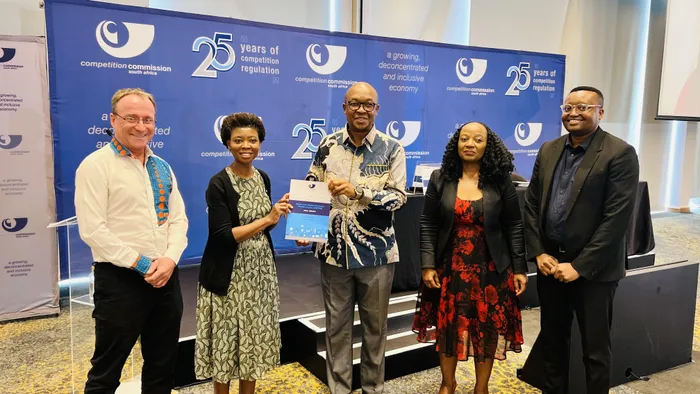
Digital Giants to Fund SA Media Recovery: Competition Commission Finalises Platform Inquiry
Image: Thabo Makwakwa / IOL
The Competition Commission has released its final report on the Media and Digital Platforms Market Inquiry (MDPMI), presenting key findings and binding remedies to foster fairness and sustainability in South Africa’s media landscape.
Following two months of negotiations, the Commission secured a broad remedial package designed to support the media industry’s recovery.
Competition Commissioner Doris Tshepe handed the report to Minister of Trade, Industry and Competition (DTIC) Parks Tau at an official launch in Sandton.
Tshepe urged the minister to seriously consider the recommendations, noting the importance of supporting struggling media houses.
“I commend all media players, including Google, who agreed to some remedial actions,” Tshepe said. “It is vital to provide a lifeline for the media sector.”
Chairperson of the Inquiry, James Hodge, underscored the monopolistic power of major global platforms dominating South Africa’s digital space.
The report reveals Google’s dominance in internet search, with news queries accounting for 5-10% of traffic and driving significant advertising revenue.
However, it does not compensate South African media outlets for displayed or summarised news content.
“Referral traffic to media websites has dropped sharply as users consume AI-generated summaries or remain within Google’s own platforms,” Hodge explained.
“Additionally, Google’s algorithms favour large foreign outlets over local and vernacular media, exacerbating content visibility and advertising inequalities.”
Microsoft exhibits similar bias through its MSN news service, contracting with only a limited number of South African publishers.
On social media, platforms like Meta (Facebook, Instagram, WhatsApp), YouTube, X, and TikTok play key roles in news distribution, especially to community and vernacular audiences.
Yet few local outlets are accredited or have the technology to monetise content effectively.
“The SABC relies heavily on YouTube but earns minimal revenue from the platform.”
The Inquiry also highlights how social media algorithms promote sensationalist content over credible news, fuelling misinformation and imposing negative social consequences on the media sector.
Comprehensive Remedies to Revitalise South African Media
“Most major platforms have agreed to the remedies and will implement them immediately,” Hodge confirmed.
At its core is a R688 million Media Support Package, agreed with Google and YouTube, to benefit national, community, and vernacular media through content licensing, innovation grants, and capacity-building efforts.
“This package includes newsroom innovation funding, contributions to the Digital News Transformation Fund, and vernacular language training via the Media Development & Diversity Agency (MDDA),” Hodge said.
Additional platform commitments include:
All platforms will introduce digital literacy programs to build media resilience and combat misinformation.
Regarding advertising technology (AdTech) and AI, the platforms will align with global best practices.
According to Hodge, Google will implement EU-style transparency measures about ad costs and remove self-preferencing in ad systems.
AI firms will provide content controls, opt-out mechanisms, and biannual training sessions.
He reported that the Inquiry recommends that the DTIC issue a block exemption to permit collective bargaining by South African media, covering monetisation terms, AI content licensing, AdTech pricing, and joint advertising sales, particularly for community media.
Further, it calls on the Department of Communication and Digital Technologies to develop self-regulatory frameworks and establish an independent Social Media Ombud under the Electronic Communications and Transactions Act.
Minister Parks Tau said he would table the report in Parliament within the legally mandated ten days.
He acknowledged the media’s vital role in democracy, freedom of expression, and holding public officials accountable.
“The shift to online news consumption, dominated by global platforms, has decimated traditional advertising revenue, including for the SABC, which relies on ads for 80% of its budget,” Tau noted.
“This has caused newsroom downsizing and media closures over five years, threatening constitutional rights and media plurality.”
While recognising that digital platforms are not solely to blame for challenges facing the media, Tau emphasised the need for fair compensation.
“I commend platforms engaged constructively in agreeing to remedies. The hard work to revitalise our media begins now, with successful implementation crucial.”
Tau confirmed he would carefully review the recommendations and consult with relevant stakeholders, including Minister Malatsi at the Department of Communication and Digital Technologies, before issuing formal decisions.
thabo.makwakwa@inl.co.za
IOL Politics
Related Topics: